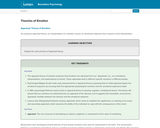
This resource explains the main premise of appraisal theory.
- Subject:
- Social Studies
- Material Type:
- Reading
- Provider:
- Lumen Learning
- Date Added:
- 10/06/2017

This resource explains the main premise of appraisal theory.
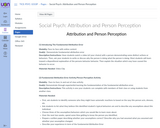
This page contains a selection of activities to familiarize students with the concepts of perception.

This program explores the evolution of cognitive psychology and how we take in information. Cognitive psychology spans a vast range of study, from the parts of the brain used in reading to the computer's impact on the study of how humans think. Cognitive Processess is the tenth program in the DISCOVERING PSYCHOLOGY series.
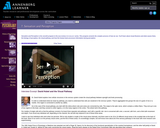
This video unravels the complex process of how we see. Students will learn about visual illusions and what causes them, the biology of perception, the visual pathway, and how the human brain processes information during perception. Sensation and Perception is the seventh program in the DISCOVERING PSYCHOLOGY series.

This research article explores facial feedback and emotions.
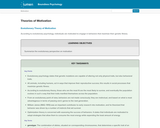
This resource summarizes the evolutionary perspective on motivation.
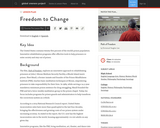
Students will watch a film to explore different programs for rehabilitating prison inmates in the United States.

This research article discusses facial expression and its affect on emotional experience.

This lesson plan explores the ways in which memory affects life and connects with other aspects of human society.
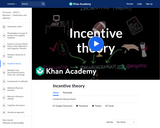
This video explains the incentive theory of motivation.
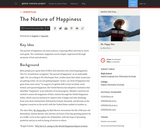
Students are challenged to consider the meaning of the word happiness and explore the themes of positive role models and encouragement.

Students create a time capsule when they being their Freshman year, and then reopen and review it as they near the end of their Senior year.
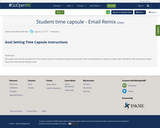
Set goals and check-in points for the school year by writing an email to yourself, then scheduling it to send at a later date. Students will read their email near the end of their Senior year.

This resource provides several activities to engage students in investigative case study and summative debate. Students prepare scientific arguments based on what they have learned.